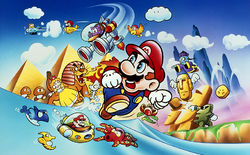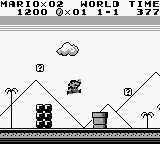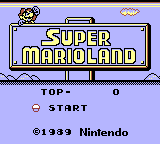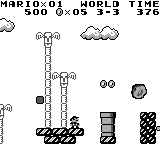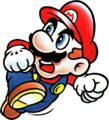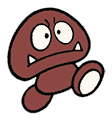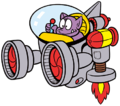Super Mario Land
This article is currently under debate in a proposal. Please do not make any major changes to the subject(s) in question until the proposal is complete.
- This article is about the video game for the Game Boy. For other uses of the name, see Super Mario Land (disambiguation).
- Not to be confused with Super Mario 3D Land.
| Super Mario Land | |||||||||||||
|---|---|---|---|---|---|---|---|---|---|---|---|---|---|
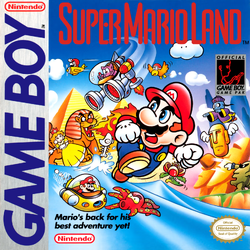 North American box art For alternate box art, see the game's gallery. | |||||||||||||
| Developer | Nintendo R&D 1 | ||||||||||||
| Publisher | Nintendo | ||||||||||||
| Platform(s) | Game Boy, Virtual Console (Nintendo 3DS), Game Boy - Nintendo Switch Online | ||||||||||||
| Release date | Game Boy: Virtual Console (Nintendo 3DS): Game Boy - Nintendo Switch Online: | ||||||||||||
| Language(s) | English (United States) | ||||||||||||
| Genre | 2D platformer | ||||||||||||
| Rating(s) |
| ||||||||||||
| Mode(s) | Single-player | ||||||||||||
| Format | Nintendo Switch: Game Boy:
Nintendo 3DS: | ||||||||||||
| Input | Nintendo Switch: Game Boy:
Nintendo 3DS:
| ||||||||||||
| Serial code(s) | DMG-MLA | ||||||||||||
Super Mario Land is the fifth entry in the Super Mario series[5] and the first installment in the titular Super Mario Land series, released as a launch title for the Game Boy in 1989 as the first handheld title in the series. Unlike previous installments, the game takes place in Sarasaland rather than the Mushroom Kingdom, and introduces Princess Daisy, a new character serving as the damsel-in-distress in place of Princess Peach. Tatanga, a malevolent alien with powers of hypnosis, serves as both the main antagonist and final boss. Unlike previous games, Super Mario Land was not developed by Shigeru Miyamoto and Nintendo's EAD division, but by Nintendo R&D1, with Gunpei Yokoi as guiding producer.
In addition to being the first of the three Super Mario Land games, this game is also the shortest, comprising of only twelve levels spanning four different worlds. It was succeeded by Super Mario Land 2: 6 Golden Coins, which introduced Wario, and Wario Land: Super Mario Land 3, which is also the first installment in the Wario Land series. Super Mario Land and its sequel were originally excluded from the main Super Mario series,[6] but were later included alongside the more traditional games in material for the Super Mario Bros. 30th Anniversary[7] and Super Mario Bros. 35th Anniversary, as well as the history pages on the Mario Portal and "The official home for Mario" websites.[8][9]
This game is notable for its inclusion of different or unrelated enemies and sound effects compared to traditional titles. Additionally, though the game did not receive critical acclaim, mainly due to its graphical capabilities and shortness in length, it sold extremely well, eventually totaling over 18 million copies sold, making it the fourth best-selling game for the Game Boy overall.
The game was re-released for the Nintendo 3DS's Virtual Console in 2011, and for Game Boy - Nintendo Switch Online for the Nintendo Switch in 2024 in celebration of the Game Boy's 35th anniversary.[2] The Virtual Console release requires 42 blocks (5.3 MB) of memory to be installed.
A board game adaptation of this game was released exclusively in Germany, titled Das Super Mario Spiel. Although the board game does not explicitly state its theming after Super Mario Land, it features the same characters, worlds, and story.
Story[edit]
The following text is taken directly from the instruction booklet.
Once upon a time, there was a peaceful world called Sarasaland. In this world there were 4 kingdoms named Birabuto, Muda, Easton and Chai. One day, the skies of Sarasaland were suddenly covered by a huge black cloud. From a crack in this cloud, the unknown space monster Tatanga emerged to try to conquer Sarasaland. Tatanga hypnotized the people of all the kingdoms so that he could control them in any way he liked. In this way he took over Sarasaland. Now, he wants to marry Princess Daisy of Sarasaland and make her his queen. Mario came to know of these events, and he has started on a journey to the Chai Kingdom where Princess Daisy is held captive, in order to restore peace to Sarasaland. Can Mario defeat Tatanga, release people from his interstellar hypnosis, and rescue Princess Daisy? It's all up to you and Mario's skill. Go for it Mario!
In this game, Mario is tasked with saving Princess Daisy and the inhabitants of Sarasaland from Tatanga. To do so, he must travel across and conquer all four kingdoms - the Birabuto Kingdom, a desert kingdom based on ancient Egypt, the Muda Kingdom, an aquatic kingdom, the Easton Kingdom, a kingdom partially based on Easter Island, and the Chai Kingdom, a kingdom inspired by mythical ancient China.
The first three kingdoms are each guarded by a boss Mario must defeat to rescue an enemy disguised as Princess Daisy. These three kingdoms are led by the Gao-like King Totomesu, Yurarin Boo-like Dragonzamasu, and Tokotoko-like Hiyoihoi. A cloud known as Biokinton is fought in the fourth kingdom. In the end, Mario must board the Sky Pop to battle and defeat Tatanga himself in his heavily armed airship, Pagosu. After he is defeated, Mario rescues Daisy and the two ride off together in a spaceship.
It is revealed in the sequel, Super Mario Land 2: 6 Golden Coins, that Wario took advantage of the events in this game to take over Mario's castle. In this game, Tatanga guards a Golden Coin, presumably working under Wario.
Gameplay[edit]
Super Mario Land is very similar to previous Super Mario platformer games. allows the player to jump, while
serves as the action command, allowing Mario to run faster.
controls where Mario walks or runs. The player may also pause at anytime with
. Jumping on an enemy usually defeats it and earns the player points. When Mario is Superball Mario, or if he is driving the Marine Pop or Sky Pop,
fires out projectiles at Mario's enemies.
Most of the bosses can either be beaten via physical attack, or by jumping on a switch behind the boss. Collecting one hundred coins earns Mario an extra life, and if he manages to earn 100,000 points, he gains an extra continue to use in the event all lives are lost.
Mario is vulnerable as Small Mario. When he gets a Super Mushroom, he grows slightly in size and is able to take damage once without losing a life, instead reverting back to his small state. If Mario collects a Superball Flower, he becomes Superball Mario, and is able to shoot Superballs at his enemies. If Mario happens to find and collect a Star, he becomes invincible, and is able to defeat any enemy just by touching it. These effects are temporary and last a short time.
At the end of every non-boss level, the player reaches a goal tower with two entrances. The lower entrance takes Mario directly to the next stage, while the upper entrance sends him to a bonus game for the chance to win a Superball Flower or one, two, or three extra lives.
After the main game is beaten, the Mushroom icon on the title screen changes to an icon of Mario's head. This allows the player to play through the game once more, with additional enemies spread throughout the levels, though no further changes occur to increase the difficulty. Beating this game unlocks a level select option. As the game has no battery backup, the title screen reverts to the standard version upon switching the Game Boy off, resetting the game, or having the batteries run out.
Controls[edit]
| Action(s) | Input(s) | |||
|---|---|---|---|---|
| Game Boy | Nintendo 3DS | Dual Joy-Con / Nintendo Switch Pro Controller / Nintendo Switch Lite | Horizontal Joy-Con | |
| Move | ||||
| Run, throw Superball, fire torpedo, fire missile | ||||
| Jump | ||||
| Pause | ||||
Worlds and levels[edit]
Super Mario Land utilizes Sarasaland as the main setting rather than the Mushroom Kingdom. The land is divided into four kingdoms serving as the corresponding worlds of the game - the Birabuto Kingdom, the Muda Kingdom, the Easton Kingdom, and the Chai Kingdom, respectively. Each world consists of three levels. These levels normally feature music, backgrounds, and enemies relevant to the themes of their respective worlds. Due to the length of the game, as well as the amount of enemies featured in the game, most enemies are indigenous to one world, while some only appear in one level. At the end of the first two levels of each world, Mario reaches a goal allowing him to advance to the next level immediately, or complete a bonus game for an item beforehand. At the end of the third and final level of each world, Mario fights and defeats a boss to rescue an enemy disguised as Daisy, with the exception of the Chai Kingdom, where he must defeat two bosses, including Tatanga, to rescue the real Daisy.
| Kingdoms | |
|---|---|
| Birabuto Kingdom | Areas |
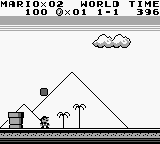
|
World 1-1 |
| World 1-2 | |
| World 1-3 | |
| The first world in the game – a desert kingdom based on ancient Egypt. Pyramids occur in the background of the first two areas, while the third one takes place within one. This world introduces a number of recurring enemies such as Goombos, Bombshell Koopas, and Piranha Plants. King Totomesu, a large Gao, is fought at the end of the third area. Defeating him leads to a Fly disguised as Princess Daisy. | |
| Muda Kingdom | Areas |
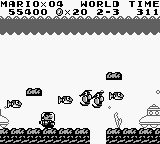
|
World 2-1 |
| World 2-2 | |
| World 2-3 | |
| Muda Kingdom is a water-themed world. Its name is invocative of Bermuda and the mythical Mu. Muda is the only kingdom to feature the Marine Pop submarine. The first two areas are beaches, while the third is entirely underwater. Most of the local enemies are based off of seahorses, carnivorous fish, and other marine animals. Dragonzamasu, a large Yurarin Boo, is fought at the end of the third area. The Daisy found here is a Gunion in disguise. | |
| Easton Kingdom | Areas |
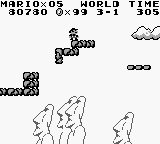
|
World 3-1 |
| World 3-2 | |
| World 3-3 | |
| This world is invocative of Easter Island. Large moai occur in the background, and a few of the local enemies resemble the statues. Hiyoihoi, a large Tokotoko who attacks by hurling Ganchan, is fought at the end of the final area. The Daisy lookalike here is a Kumo. | |
| Chai Kingdom | Areas |
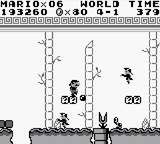
|
World 4-1 |
| World 4-2 | |
| World 4-3 | |
| The final world – a land based on China. The first area is a dense bamboo forest. The third one takes place above the clouds, and is the only one to include the Sky Pop. A few of the local enemies seem to be derived from Chinese folklore, while others are affiliates of the local bosses and only occur in the sky. In addition to the cloud boss Biokinton, the final boss Tatanga occurs in the third area. Defeating him rescues the true Princess Daisy. | |
Enemies and obstacles[edit]
Enemies[edit]
There are ~25 enemies in Super Mario Land, most of which occur only within one kingdom. These enemies are of designs culturally tied to the kingdom and are wholly new to the Super Mario series. Examples include Gao, which resembles an Egyptian sphinx, and Pionpi, which resembles the jiangshi of Chinese folklore. Only two enemies previously appeared in the franchise: Piranha Plants from Super Mario Bros. and Fighterflies from the Mario Bros. arcade game. The latter are simply called "Flies" in this game.
When localized for English-speaking territories in 1989, most enemies were given English names that were loose romanizations of their Japanese ones. This included the returning Piranha Plants, which are referred to as "Pakkun Flowers" in the instruction booklet and accompanying guides for Super Mario Land. The only major exception are Kumos. When rereleased in 2011 for the Nintendo 3DS Virtual Console, the accompanying eGuide introduced new English names for the enemies that are related to more recurring species in the Super Mario series. Namely: Chibibo were renamed Goombos; Nokobon were renamed Bombshell Koopas; Pakkun Flowers were clarified to be Piranha Plants; and Gira were renamed Bullet Biffs. These are the names acknowledged below. With the exception of the Piranha Plants, none of these names were incorporated into the Mario Portal Game Archive for Super Mario Land in 2022, which instead uses the names from the original 1989 instruction booklet.
| Image | Name | Description | Appearances | Theme | Pts. | New | |
|---|---|---|---|---|---|---|---|
| First | Last | ||||||
| Goombo | The Goomba relatives of Sarasaland. Goombos walk forward and walk over the edge of platforms. They only turn around when they hit opposing walls. Goombos are defeated when stomped. | World 1-1 | World 4-2 | Ground | 100 | ||
| Bombshell Koopa | Koopa Troopas with bombs for a shells. Stomping one makes it recede into its shell, which subsequently explodes. The blast damages Mario. Bombshell Koopas are safely defeated when hit by Superballs or knocked off platforms. They do not detonate in either case. | World 1-1 | World 4-2 | Ground | 100 | ||
| Fly | Flies bounce along the ground. They are defeated when stomped or struck by two Superballs. | World 1-1 | Ground | 400 | — | ||
| Bunbun | Flying bees that carry arrows. Bunbun travel horizontally and periodically pause to drop arrows. They are defeated when stomped or struck by a Superball. | World 1-2 | Sky | 800 | |||
| Piranha Plant | Carnivorous plants that pop out of pipes. Attempting to stomp Piranha Plants damages Mario. They are defeated only with Superballs. Standing next to or directly on their pipes keeps them from emerging. | World 1-3 | World 4-2 | Underground | 100 | — | |
| Upside-down Piranha Plant | These Piranha Plants extend from overhead pipes and cannot be inhibited. | World 4-1 | World 4-2 | Underground | 400 | — | |
| Gao | Sphinxes that breathe fire. They are defeated when stomped or struck by a Superball. In Hard Mode, a Gao appears in World 1-1. | World 1-3 | Underground | 800 | |||
| Honen | Undead Torion. Honen leap vertically from offscreen. They can be defeated with any attack. | World 2-1 | World 2-3 | Underwater | 100 | ||
| Torion | Man-eating fish that swim in schools of three. They make a u-turn when they reach the left edge of the screen. Torion are defeated when struck by one of the Marine Pop's torpedoes. | World 2-3 | Underwater | 100 | |||
| Yurarin Boo | Fire-breathing Yurarin. They move vertically and spit fireballs in Mario's direction. Yurarin Boos are defeated when stomped or struck by two torpedoes. | World 2-1 | World 2-3 | Underwater | 400 | ||
| Yurarin | Seahorse enemies that either swim right to left or in diagonal patterns. They are defeated when struck by two torpedoes. | World 2-3 | Underwater | 400 | |||
| Mekabon | Squat robots. Mekabon throw their heads at Mario. Stomping on them the heads break them, but they regenerate after a few seconds. Striking the headless bodies with any attack defeats them. Striking an intact Mekabon as Invincible Mario defeats it. Unlike Goombos, Mekabon turn around when they reach the edge of platforms. | World 2-2 | Ground | 400 100 |
|||
| Gunion | Octopus enemies. Gunion are defeated when struck by three torpedoes, but doing so splits them into two targeting fireballs. | World 2-3 | Underwater | 800 | |||
| Tamao | Eyeball creatures that surround Dragonzamasu. Tamao bounce against walls and ceilings. They damage Mario on contact. | World 2-3 | Underwater | ||||
| Tokotoko | Moai enemies that shuffle across the ground. They are defeated when stomped or struck by a Superball. | World 3-1 | World 3-3 | Ground | 400 | ||
| Batadon | Winged Tokotoko that bounce across terrain. They are defeated when stomped or struck by three Superballs. | World 3-1 | World 3-3 | Sky | 800 | ||
| Ganchan | Living boulders that bound around. Ganchan cannot be defeated, but they can be stood on and used as platforms to reach distant areas. The boss Hiyoihoi tosses Ganchan. | World 3-1 | World 3-3 | Sky | |||
| Bullet Biff | Bullet Bill relatives launched from Pipe Cannons and Roketon. Bullet Biffs fly across the screen horizontally. They are defeated when stomped. | World 3-1 | World 4-3 | Sky | 400 | ||
| Suu | Striped spiders. Suu descend from the ceiling on silk to strike Mario. They are defeated when stomped or struck by two Superballs. | World 3-2 | Underground | 400 | |||
| Kumo | Hairy spiders that bounce across terrain. They are defeated when stomped or struck by two Superballs. | World 3-2 | World 3-3 | Underground | 400 | ||
| Pionpi | Undead beings that hop along the ground. Jumping on Pionpi briefly stuns them. They are defeated only when struck by two Superballs. | World 4-1 | Ground | 800 | |||
| Pompon Flower | Walking flowers that release toxic pollen. They are defeated when stomped or struck by two Superballs. | World 4-2 | Ground | 800 | |||
| Nyololin | Snakes that sit still and spit fireballs. The flames move through solid terrain and platforms. Nyololins are defeated when stumped or struck by a Superball. | World 4-2 | Ground | 800 | |||
| Chicken | Helmeted birds that fly through the sky and are released by Biokinton. Contact damages Mario. They are defeated when struck by one of the Sky Pop's missiles. | World 4-3 | Sky | 400 | |||
| Roketon | Tatanga's attack pilots. Roketon fire Bullet Biffs backwards as Mario flies past them. They are defeated when struck by a missile. | World 4-3 | Sky | 400 | |||
| Chikako | Mid-air, electrical enemies. A Chikako is defeated only when struck by ten missiles, or when touch by Mario in his Invincible form. | World 4-3 | Sky | 800 | |||
Obstacles[edit]
| Image | Name | Description | Appearances | |
|---|---|---|---|---|
| First | Last | |||
| Falling spike | Spikes that fall from the ceiling when approached. | World 3-2 | ||
| Pipe Cannon | Cannons that fire Bullet Biffs. Pipe Cannons periodically rise from pipes and recede afterward firing. They do this regardless of Mario's proximity to the pipes. Mario can safely stand on top of a Pipe Cannon. | World 3-1 | World 4-2 | |
| Pipe Fist | These fists emerge from pipes like Piranha Plants, though slightly faster. They occur in pairs that alternate their punches. A third Pipe Fist occurs in Hard Mode. | World 4-3 | ||
| Poison needles | Spikes laid across the ground. Contact makes Mario lose a life. Long stretches of poison needles can be avoided by hopping across bouncing Ganchan. | World 3-1 | World 3-3 | |

|
Roto Disc | Spinning flames that encircle blocks. The flame damages Mario on contact. | World 4-2 | World 4-3 |
Bosses[edit]
Bosses are listed in the order that they are first encountered. All bosses reward Mario with 5000 points when defeated.
| Image | Name | Description | Location | Themes |
|---|---|---|---|---|
| King Totomesu | This Gao breathes fireballs horizontally and periodically jumps. He is defeated when struck by five Superballs or when the switch behind him is struck. | World 1-3 | Underground | |
| Dragonzamasu | A giant Yurarin Boo that swims up and down, shooting fireballs. It is defeated when struck by twenty torpedoes or by striking the switch behind it. Tamao surround the boss. | World 2-3 | Underwater | |
| Hiyoihoi | Throws Ganchan at Mario. Hiyoihoi is defeated by ten Superballs or by leaping over it on Ganchan to reach the switch. | World 3-3 | Ground | |
| Biokinton | A cloud boss the bounces all around the area, releasing Chickens at Mario. To defeat Biokinton, he must be hit with twenty missiles. | World 4-3 | Sky | |
| Tatanga | The mysterious alien that kidnaped Princess Daisy. Tatanga hovers around the right-side of the arena in his spaceship Pagosu, firing round projectiles that split into three smaller ones. It takes multiple missiles to destroy the projectiles, making it harder to shoot the ship. Once the Pagosu is destroyed, Tatanga and the boss room vanish. | World 4-3 | Sky |
Items and objects[edit]
Items[edit]
These are collectibles, pickups, and power-ups.
| Image | Name | Description |
|---|---|---|
| 1UP heart | 1UP hearts are found in Mystery Blocks and bricks. Collecting one grants Mario an extra life, though it must be collected before it falls through the ground. | |
| Coin | Coins may be found in Mystery Blocks as well as in groups. They may also be collected with Superballs. Each coin Mario collects earns him one hundred points, while collecting one hundred coins earns him an extra life. | |
| Super Mushroom | The classic Super Mushroom powers Mario up into Super Mario, allowing him to release Superball Flowers from blocks, break bricks, and take damage once before reverting to his Small form. | |
| Flower | A new item, the Superball Flower can only be found in blocks or the bonus game. It allows Mario to shoot Superballs, which bounce off surfaces such as floors, walls, and ceilings to collect coins and defeat enemies, similarly to how the Fire Flower allows him to shoot fireballs. Mario's Superball form looks the same as his Super form. | |
| Star | Stars are rare items granting Mario brief invincibility from enemies. Rather than the usual invincibility theme, two loops of an excerpt from the famous "Galop infernal" from Orpheus in the Underworld by Jacques Offenbach, a tune most commonly associated with the can-can, play while Mario is invincible. | |
| Marine Pop | A submarine found and used only in 2-3. Allows Mario to shoot torpedoes at a number of aquatic enemies, including the boss Dragonzamasu. Super Mushrooms and Stars affect the Marine Pop as well. | |
| Sky Pop | An airplane appearing only in the final level, 4-3. It fires missiles, used to defeat both Biokinton and Tatanga. After the real Daisy is rescued, she and Mario ride off in the Sky Pop. |
Objects[edit]
| Image | Name | Description |
|---|---|---|
| Brick | Blocks that break when struck. Some bricks contain rarer items, while some can produce a number of coins. | |
| Dropping lift | Footholds that fall when stood on for a short time. | |
| Elevator | Platforms that appear only in Worlds 1-3 and 3-2 in Hidden Blocks. Mario can ride Elevators up to find coins or a pipe to a secret room. | |
| Falling block | Slabs that fall from the ceiling when approached. They are present only in Worlds 1-3 and 4-1. | |
| Lift | Thin, moving platforms. They can carry Mario across distant areas. | |
| Mystery Block | Blocks that produce items or coins when struck. Some blocks release up to ten coins when hit in rapid succession. | |
| Pipe | Mario can enter most pipes to reach hidden or secret areas, as well as exit them. | |
| Switch | Switches found in most boss rooms. Touching one defeats the resident boss. The switches provide an alternative way to defeat bosses without directly attacking them. |
Revision[edit]
When playing Super Mario Land on a Game Boy Color, the game will display colors using a unique hardware-coded color palette.
Later printings of the game featured alterations to the soundtrack[10] and fixed the screen wraparound glitch of the original release.[10]
Development[edit]
- See also: List of Super Mario Land staff
Super Mario Land was initially set to be the pack-in game for the Game Boy. However, Henk Rogers of Bullet-Proof Software managed to convince NOA president Minoru Arakawa that Tetris would have wider appeal.[11]
The game was developed by Nintendo R&D 1 rather than by Nintendo EAD, making it the first Super Mario platformer to not be developed by EAD. Gunpei Yokoi acted as the producer and future R&D manager Satoru Okada was the director. Hirokazu Tanaka handled the sound effects and soundtrack.
Nintendo eShop description[edit]
- North American version
Ancient ruins, giant crabs, Koopa Troopas, flying stone heads, and hungry sharks await you in this rerelease of the 1989 Game Boy™ game. In the beautiful kingdom of Sarasaland, a mysterious alien has appeared and hypnotized the inhabitants while kidnapping Princess Daisy™ for himself! Travel over land, in the air, and underwater as Mario™ runs, jumps, and bounces his way to fortune and glory on his mission to save Princess Daisy and restore peace! Ancient ruins, tempestuous waters, and brand new challenges await!
- European version
Mario’s acclaimed Game Boy debut brings the plucky plumber to new territory: Sarasaland, where the evil space monster Tatanga has hypnotised the people and kidnapped Princess Daisy!
While the gameplay will be at first familiar, with the winning blend of platforming and power-ups, Super Mario Land is unique for introducing vehicles for Mario to ride: the Sky Pop aeroplane and Marine Pop submarine.
You'll need all your skills on land, in the sea and through the air, to traverse the four diverse kingdoms of Sarasaland in your quest to defeat the dastardly Tatanga and rescue Daisy.
Soundtrack[edit]
Super Mario Land was the first Super Mario title to support stereo sound, a native feature of the Game Boy via the included 3.5mm headphone jack (previous Nintendo hardware exclusively outputted mono sound). To fit in with this, the game's music features heavy use of both the left and right channels in addition to the center of the soundstage. The Revision 1 reissue would remix the game's soundtrack to adjust the use of stereo sound, centering the percussion in the Marine Pop/Sky Pop theme and moving the first percussion hit in the Sarasaland, cave, and credits themes from the center to the right channel.[12]
To tie in with the game's Japanese release, an original soundtrack for the game was published in that region by Nippon Columbia, featuring arrangements of ten of Tanaka's compositions by Ikuro Fugiwara, and performed by the "Mario Freaks Orchestra."
Game Boy[edit]
- Main article: Game Boy (comic)
Super Mario Land was the focus of Game Boy, a 4-issues miniseries published by Valiant Comics as part of its Nintendo Comics System brand. The series had Tatanga and his minions invade the Real World after being summoned by disgrunted electronic store worker Herman Smirch, while Mario fought to foil their efforts.
Reception[edit]
Super Mario Land received mostly positive reviews. The difficulty, the length of the game, the price, and the overall gameplay experience were among the most discussed aspects of the game. The game has received a 77.94% based on 8 reviews.[13]
Corbie Dillard of Nintendo Life noted the successors of the game as superior in both length and quality, praising the sequel, Super Mario Land 2: Six Golden Coins, as the better game, despite the price. However, he recommended playing the game in commemoration of Mario's first portable experience. Adam Riley of Cubed3 scored the game well, also acknowledging the standards achieved by later games, while also recommending the game as a short and sweet adventure.
Additionally, Lucas M. Thomas of IGN, noted the differences between the game and standard titles as odd, focusing on the graphical and other visual capabilities. Nevertheless, he gave the game a good 7.5/10 rating, calling it a "small, singular oddball", though worth the small purchase.[14]
Ryan Lambie of Den of Geek reviewed the game on a much more positive note, referring to it as both an "underrated classic" and "weird but deeply lovable handheld classic", complimenting the difficulty, music, and simplified graphics, among various other aspects of the game.[15]
On GameSpot, the game received an average rating of 8.1 out of over 2,000 reviews, with almost half of the ratings being 8/10.[16] The more positive reviews praised the simple though memorable elements of gameplay. The neutral or mixed reviews noted the short length of the game and the graphical capabilities, while acknowledging some of the aforementioned positive traits the game had to offer. Various negative or critical reviews heavily or harshly criticized the graphics and length in addition to other aspects such as the controls and inexplicable differences from main games in the series.
| Reviews | |||
|---|---|---|---|
| Release | Reviewer, Publication | Score | Comment |
| Game Boy | Lucas M. Thomas, IGN | 7.5/10 | "With history as it is, though, Super Mario Land simply stands alone in time as a small, singular oddball. Its weirdest elements and tiny sense of scale would be brushed aside as Mario moved on, as titles like the sequel Super Mario Land 2 pushed the camera closer and began bringing back more traditional power-ups like the common Fire Flower (instead of the rubber bouncy ball version). If you'd like to experience this moment when Mario first toyed with the idea of becoming a full-time pilot or submarine commander, though, there's no better time than now -- at a price of just $3.99 in the newly-launched 3DS eShop, tickets to visit this small, weird Land are definitely affordable." |
| Nintendo 3DS | Corbie Dillard, Nintendo Life | 7/10 | "Super Mario Land was impressive when it was first released for the Game Boy, but given how the length and overall quality of Game Boy releases increased shortly thereafter, it only made this original seem even more inadequate by comparison. It's not the best launching-off point for the 3DS eShop — Super Mario Land 2: Six Golden Coins is by far the better game — and it is the most expensive of the launch Virtual Console titles at $3.99/£3.60. It's still a very fun Super Mario experience, but just about the time things are really getting good, the experience ends and the credits roll. If you haven't played Super Mario Land before, you owe it to yourself to at least give the game a try. The quest might be fairly short, but it's still worth playing through at least once, if only to see where Mario's portable adventures began." |
| Nintendo 3DS | Adam Riley, Cubed3 | 8/10 | "Despite not particularly ageing too well, looking graphically rather shabby and not offering a considerable amount of challenge or any replay value, at its heart Super Mario Land is still a fantastic piece of history in the platform genre, and a thoroughly enjoyable romp for Super Mario fans in general." |
| Aggregators | |||
| Compiler | Platform / Score | ||
| GameRankings | 77.94% | ||
Sales[edit]
The game sold very well. It became the fourth best-selling Game Boy game, with over 18 million copies sold.[17] Additionally, it is currently the tenth Super Mario game with the most sales overall, as well as the sixth best-selling portable Super Mario game, being surpassed by New Super Mario Bros. and Mario Kart DS, both for the Nintendo DS, and Mario Kart 7 for the Nintendo 3DS, as well as Super Mario Odyssey and Mario Kart 8 Deluxe, both for the Nintendo Switch.
Pre-release and unused content[edit]
The theme that played when climbing ladders lasted much longer, over five seconds longer than necessary.
A tile reserved for a Hidden Block existed in 3-3, though was ultimately unused, rendering it futile.
Various jingles, including the death and goal themes, originally had less detailed audio, with no background tracks.
Several enemies and platforms were misplaced in certain levels, indicating developmental oversight. For instance, a Bombshell Koopa is placed right above a pit in 3-2, and can only be spotted if quick enough.
Gallery[edit]
- For this subject's image gallery, see Gallery:Super Mario Land.
Artwork[edit]
Mario in the Sky Pop
Sprites[edit]
Media[edit]
- For a complete list of media for this subject, see List of Super Mario Land media.
Glitches[edit]
- Main article: List of Super Mario Land glitches
Ganchan Coin glitch[edit]
During the battle against Hiyoihoi, Mario must be on the left edge of the boss's platform. If done correctly, every time the boss throws a Ganchan, Mario collects it as a coin.
Simultaneous sound glitch[edit]
In Muda Kingdom-1, Mario must get hit by a Honen at the same time he falls from the bottom side of the screen, causing a glitched sound to play instead of the regular sound effects. This also happens in Muda Kingdom-3 if Mario auto-fires a wall while turning into Super Mario.
References to other games[edit]
- Super Mario Bros. / Super Mario Bros.: The Lost Levels: Super Mario Land's World 1-3, and to a lesser extent World 3-3, have similar designs to these games' Castle levels; in the former, the boss fight against King Totomesu is even similar to the boss fights against Bowser and his fakes in these games. The Sky Pop and Marine Pop music is similar to the Ground Theme from this game.
References in later games[edit]
- Tetris: The font[18][better source needed] and some sound effects such as the pause sound effect are reused in the Game Boy version of this game.
- Super Mario Bros. Deluxe: In the Calendar feature, Super Mario Land's Japanese release date - April 21, 1989 - is marked by default with the message "A Peaceful Day".
- Super Smash Bros. Melee: One of Peach's alternate costumes is based on Daisy's classic design.
- WarioWare, Inc.: Mega Microgame$!: The microgame Grow Wario Grow features Mario's sprite and background graphics from Super Mario Land.
- Super Smash Bros. Brawl: A remix of the Underground Theme appears as one of the randomly-collectible music CDs for the World 1-2 version of Mushroomy Kingdom, as well as The Subspace Emissary's The Path to the Ruins (underground segment), The Ruins, and the parts of The Great Maze which are based on those two stages.
- Mario & Sonic at the Sochi 2014 Olympic Winter Games: An arrangement of the Main Theme is featured as one of the selectable songs for Figure Skating Pairs.
- Mario Kart 8: In the Water Park's submarine building, there is a sign which says that submarines were first used in 1989, which references the Marine Pop sections and the release year of Super Mario Land.
- Yoshi's Woolly World: One of Yoshi's transformations in this game is based on the Sky Pop.
- Super Mario Maker: The Sky Pop appears as a Costume Mario costume, unlocked by completing the "Southwest Air Adventure" Event Course. All of the costume's sound effects and fanfares are taken from Super Mario Land. Pressing up plays the sound for collecting a coin.
- Paper Mario: Color Splash: A rearrangement of the Super Mario Land credits theme is present in this game in the Roshambo Temples.
- Super Mario Run: The Remix 10 song contains a portion of the Dungeon theme.
- WarioWare Gold: This game contains a microgame based off of Super Mario Land, which involves Mario throwing Superballs at enemies.
- Super Mario Maker 2: The Superball Flower is an obtainable power-up for the Super Mario Bros. style. Using it replaces the stage music with a rearrangement of the Super Mario Land Ground Theme, and the "level clear" and "lose a life" themes with their Super Mario Land counterparts.
- WarioWare: Get It Together!: There is a microgame based on the game where the player must hit a ? Block.
Names in other languages[edit]
| Language | Name | Meaning |
|---|---|---|
| Japanese | スーパーマリオランド Sūpā Mario Rando |
Super Mario Land |
| Chinese (simplified) | 超级马力欧乐园 (From WarioWare: Get It Together!) Chāojí Mǎlì'ōu Lèyuán |
Super Mario Wonderland |
| Chinese (traditional) | 超級瑪利歐樂園[19] Chāojí Mǎlì'ōu Lèyuán |
Super Mario Wonderland |
| Korean | Super Mario Land[20] |
- |
Trivia[edit]
- Both the back of the package and the Nintendo eShop description for the game state that Koopa Troopas appear, when in fact, only Bombshell Koopas appear.
- "Giant crabs" are also mentioned despite no crabs appearing in the game.
- Super Mario Land is the first Super Mario game to be released during the Heisei era in Japan, following the death of emperor Hirohito and ascension of prince Akihito the previous January.[citation needed]
External links[edit]
References[edit]
- ^ Super Mario Land (Video Game 1989) - Release info. IMDb (English). Retrieved May 31, 2024.[better source needed]
- ^ a b Nintendo of America (May 14, 2024). Game Boy – May 2024 Game Updates – Nintendo Switch Online. YouTube (American English). Retrieved May 14, 2024.
- ^ Nintendo 公式チャンネル (May 14, 2024). ファミリーコンピュータ & スーパーファミコン & ゲームボーイ Nintendo Switch Online 追加タイトル [2024年5月15日]. YouTube (Japanese). Retrieved May 14, 2024.
- ^ @NintendoAUNZ (May 15, 2024). Three classic games are now available to play for #NintendoSwitchOnline members! #GameBoy: ☑️ Super Mario Land ☑️ Alleyway ☑️ Baseball. X. Retrieved May 15, 2024.
- ^ Kazuya Sakai (Ambit), kikai, Akinori Sao, Junko Fukuda, Kunio Takayama, and Ko Nakahara (Shogakukan) (ed.) (2018). Encyclopedia Super Mario Bros.. Milwaulkie: Dark Horse Books. ISBN 978-4-09-106569-8.
- ^ "Oh yeah, Princess Daisy from the Game Boy "Land" series is another princess altogether." – January 1997. Nintendo Power volume 92. Nintendo of America (American English). Page 7.
- ^ Official Japanese artwork for the 30th Anniversary of Super Mario Bros. illustrating the games part of the Super Mario series.
- ^ History (Super Mario Land appears when filtering for the Super Mario series). Mario Portal website.
- ^ The official home of Super Mario™ – History. Nintendo of America (American English). Retrieved May 22, 2024.
- ^ a b The Cutting Room Floor's page on Super Mario Land, TCRF.net. Retrieved August 8, 2016
- ^ June 12, 2009. Alexey Pajitnov Stars Interview - Video Interview: Alexey Pajitnov Pt. 1. IGN. Retrieved May 23, 2024.
- ^ Super Mario Land. The Cutting Room Floor. Retrieved January 13, 2024.
- ^ Score for Super Mario Land. GameRankings. Archived December 9, 2019, 01:50:04 UTC from the original via Wayback Machine.
- ^ Thomas, Lucas M. (June 15, 2011). Super Mario Land Review. IGN (English). Retrieved May 23, 2024.
- ^ Lambie, Ryan (April 22, 2019). Super Mario Land: The Brilliance of an Underrated Classic. Den of Geek (English). Retrieved June 22, 2021.
- ^ Super Mario Land reviews. Retrieved June 10, 2021.
- ^ Radic, Vedran. (Nov 15, 2020). 10 Best Selling Super Mario Games, Ranked (& How Much They Sold). GameRant. Retrieved June 10, 2021.
- ^ Random Talking Bush. Spritesheet. The Spriters Resource. Retrieved May 23, 2024.
- ^ Official Chinese website for the Super Mario Bros. 35th Anniversary. Nintendo HK. Retrieved November 21, 2020.
- ^ From the Korean version of Super Smash Bros. Ultimate.
| Super Mario Land | |
|---|---|
| Protagonists | Mario • Princess Daisy |
| Bosses | King Totomesu • Dragonzamasu (Tamao) • Hiyoihoi • Biokinton (Chicken) • Tatanga (Pagosu) |
| Locations | Sarasaland (Birabuto Kingdom • Muda Kingdom • Easton Kingdom • Chai Kingdom) |
| Levels | World 1-1 • World 1-2 • World 1-3 • World 2-1 • World 2-2 • World 2-3 • World 3-1 • World 3-2 • World 3-3 • World 4-1 • World 4-2 • World 4-3 • Expert Level |
| Items & vehicles | Super Mushroom • Superball Flower • Star • 1UP heart • Coin • Marine Pop • Sky Pop • Switch • Lift Block |
| Enemies & obstacles | Batadon • Bombshell Koopa • Bullet Biff • Bunbun • Chikako • Dropping lift • Falling block • Falling spike • Fly • Ganchan • Gao • Gunion • Goombo • Honen • Kumo • Mekabon • Nyololin • Pionpi • Pipe Fist • Piranha Plant • Pompon Flower • Roketon • Roto Disc • Suu • Tokotoko • Torion • Yurarin • Yurarin Boo |
| Other | Brick • Bonus game • Das Super Mario Spiel • Gallery • Glitches • Goal • Media • Mystery Block • Sub-area • Soundtrack |
| Game Boy games | |
|---|---|
| Super Mario franchise | Alleyway (1989) • Baseball (1989) • Super Mario Land (1989) • Golf (1989) • Dr. Mario (1990) • Super Mario Land 2: 6 Golden Coins (1992) • Donkey Kong (1994) • Mario's Picross (1995) • Picross 2 (1996) |
| Donkey Kong franchise | Donkey Kong (1994) • Donkey Kong Land (1995) • Donkey Kong Land 2 (1996) • Donkey Kong Land III (1997) |
| Yoshi franchise | Yoshi (1991) • Yoshi's Cookie (1992) • Tetris Attack (1996) |
| Wario franchise | Wario Land: Super Mario Land 3 (1994) • Wario Blast: Featuring Bomberman! (1994) • Wario Land II (1998) |
| Miscellaneous | Tetris (1989) • The Legend of Zelda: Link's Awakening (1993) • Game & Watch Gallery (1997) • Game & Watch Gallery 2 (1997) |
